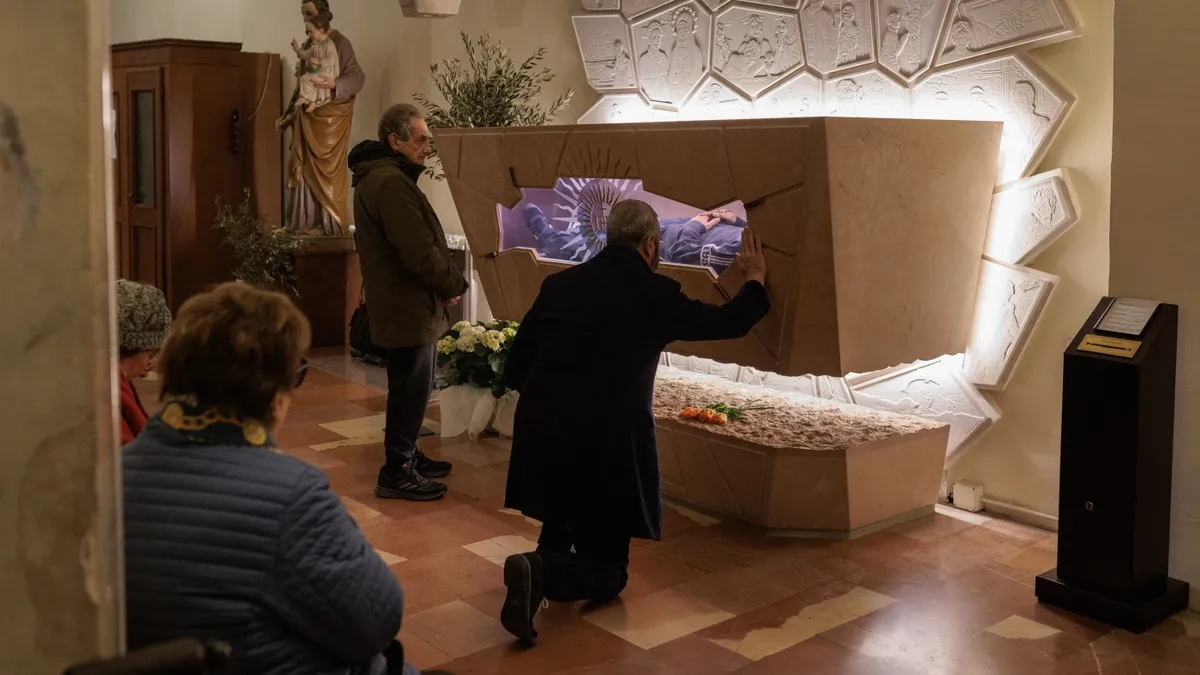
ASSISI, Italy — In the serene environment of St. Mary Major Church in this charming central Italian hill town, a group of Polish teenagers quietly strolls past a glass-sided tomb, catching a glimpse of a child their own age. The boy inside the tomb is Carlo Acutis, recognized as the first millennial saint and affectionately referred to in the Catholic Church as God's influencer. Acutis, who tragically succumbed to leukemia at the young age of 15 in 2006, is set to be canonized during a ceremony at the Vatican this Sunday, presided over by Pope Leo XIV. This momentous event is expected to draw thousands of devotees eager to celebrate the first saint of the digital age.
Acutis was a teenager who witnessed the explosion of the internet, cellphones, and social media. He adeptly utilized these modern communication tools to develop a website dedicated to cataloging and promoting eucharistic miracles, which are significant events associated with the Catholic sacrament of Communion. His rapid rise to sainthood has ignited enthusiasm among Catholics worldwide. The Blessed Acutis receives countless prayers and requests for miracles, often facilitated through the internet. His tomb is even livestreamed around the clock, allowing devotees to connect with him virtually. Many leave messages under prayer videos on platforms like YouTube, with testimonies such as requests for healing and miraculous interventions.
Assisi, known for being the resting place of saints like St. Francis and St. Clare, has become a pilgrimage site for nearly 1 million visitors last year, according to local church officials. Among these seekers, Carlo Acutis has carved out a special place in their hearts. Shops in Assisi now sell an array of memorabilia featuring his likeness, from mugs and keychains to rosaries. Online, a wooden statue of Acutis is available for over $14,000, while the Catholic Church has had to request police intervention to combat the sale of fake locks of his hair.
It is a rare occurrence for a saint's parents to be alive to witness their child's canonization, a situation that brings mixed emotions for Acutis' mother, Antonia Salzano. In an interview with NPR, she humorously remarked, "Of course it doesn’t mean that my mother is a saint," acknowledging the weight of the responsibility that comes with her son’s newfound status. Dressed in black, Salzano met NPR in a garden near the church, amid the steady stream of visitors paying their respects at her son's tomb. Over the years, she has made numerous media appearances, tirelessly promoting and protecting her son's legacy, especially during the Vatican's deliberations on his sainthood.
Acutis was born on May 3, 1991, in London but moved to Milan with his Italian parents as a child. His mother recalls his remarkable intelligence, saying he spoke his first words at just three months and could converse fluently by five months. Early on, Acutis demonstrated a compassionate spirit, often wanting to share his toys with others and requesting his parents to help the less fortunate. By the age of seven, he was attending Mass daily and, at nine, was already delving into university-level computing texts, teaching himself various coding languages.
Salzano’s memoir, My Son Carlo, captures the harrowing days following Acutis’ sudden diagnosis of leukemia, which led to his untimely passing. After his death, she experienced a dream in which Carlo reassured her that she would become a mother again. Remarkably, she conceived twins shortly thereafter, which she believes was a miraculous gift from her son. The Catholic Church requires miracles to be documented for sainthood, and for Acutis, the Vatican recognizes two significant cases: a miraculous healing of a four-year-old Brazilian boy and the recovery of a 21-year-old woman in Costa Rica after a severe bicycle accident, both of whom had prayed to Acutis for assistance.
To be officially recognized as a saint, candidates undergo a thorough examination by the Vatican's Dicastery for the Causes of Saints. This process is intricate and often lengthy, requiring evidence of the candidate's spiritual life and influence posthumously. Acutis’ journey toward sainthood began in 2012 when the Archdiocese of Milan initiated the application for his beatification. Salzano has publicly shared that the family has covered significant costs associated with this process, which can reach hundreds of thousands of dollars.
A postulator is appointed in Rome to manage the bureaucratic procedures, and in Acutis' case, it is Nicola Gori, a writer who has authored a book about him. According to Archbishop Domenico Sorrentino of Assisi, Acutis’ rapid ascent to sainthood reflects a blend of divine will and the Church’s contemporary needs, particularly its efforts to engage Generation Z. "Young people nowadays are so difficult," he commented. "The model of a young man who found his joy and purpose in Jesus is incredibly significant."
The modern design of Acutis’ tomb starkly contrasts with the ancient architecture surrounding it in the 11th-century church. The casket appears to levitate against the wall, illuminated by a soft, white light from below. During a visit from NPR, a man named João Claro Pinto knelt by the tomb, tears streaming down his face as he expressed gratitude for Acutis’ intercession in his son's recovery from meningitis.
As pilgrims flock to Assisi to honor Acutis, parts of his remains are also traveling as holy relics around the globe. Anthony Figueiredo, a British priest with the Diocese of Assisi, carries a piece of Acutis’ pericardium, which is touring various countries. Figueiredo noted that the relic has drawn crowds of thousands, with one event in Ireland attracting over 15,000 attendees, all eager to connect with the saint. The pericardium is treated with the utmost respect, requiring special customs clearance for transport, yet Figueiredo shares that this process has been relatively smooth.
As the date of Acutis’ canonization approaches, the hope he embodies resonates deeply, particularly among the youth. Figueiredo encapsulates this sentiment, stating, "Having been born in this era, Acutis takes us under his wings, knowing us. The saint of youth gives people hope."